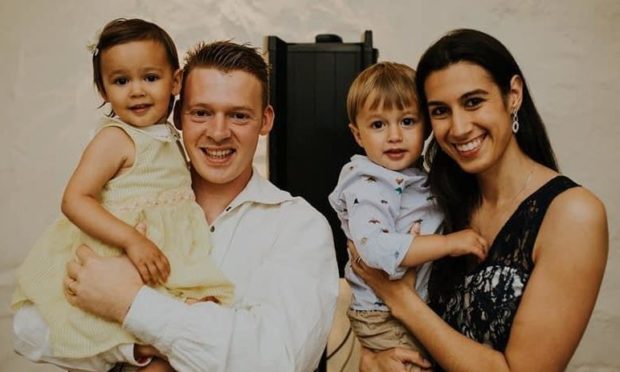A Dundee mum-of-two, who suffered a stroke at the age of just 28 after an allergic reaction to medication for heavy periods, is backing Stroke Association’s funding of vital Covid-19 research.
Since the start of the Covid-19 pandemic there have been widespread reports of adults with the virus also having strokes.
Stroke Association’s world-first study into the long-term impact of Covid-19 on stroke survivors launches today. It comes amid concerns the virus may be causing more severe strokes in patients doctors are struggling to treat.
Lucy Gourlay, 31, is mum to four-year-old twins Skye and Stuart who were just 17 months at the time of her stroke. She feels very strongly about the research.
“I could not imagine having had my stroke and not having anyone visit me in the hospital or help me when I got home with my children, because of the pandemic. Because I know how much help I needed.
“So I welcome this research into Covid-19 and stroke, to really help understand it and to support people.”
Lucy continues: “I don’t smoke, I’m not overweight, I am within the normal weight range for my height, I don’t drink excessively and there’s no history of strokes in my family. I don’t have any risk factors for a stroke.”
The three different types of strokes:
◾Ischaemic: A blockage cutting off the blood supply to the brain
◾Haemorrhagic: Bleeding in or around the brain
◾TIA or mini-stroke: Same as a stroke, but the symptoms last a short timeLearn more: https://t.co/mj4rhyZ3Il#WednesdayWisdom pic.twitter.com/sUDCrsfljo
— Stroke Association (@TheStrokeAssoc) April 28, 2021
She was at home with the twins when she started to feel “odd and unwell”.
“Despite my speech being OK at the time, something at the back of my mind told me I might be having a stroke.
“But I refused to believe it. And because of that, I didn’t call an ambulance. I did call my husband Iain who was away working at the time.
“He advised me to dial 111 and after answering some questions, the emergency services told me to go to hospital. I got to A&E and within two hours I felt very unwell.”
Later, Lucy’s leg felt numb and she couldn’t feel or move her arm.
‘I had to have emergency surgery, I was so poorly’
Scans later showed she had three clots that had created blockages and she had to have emergency surgery and five blood transfusions.
Lucy explains: “The first thing they had to sort was my treatment. I had to have emergency surgery. I was so poorly at the time.
“I didn’t even know my name at one point and was struggling to stay conscious.
“I had heavy menstrual bleeding so giving me drugs to thin my blood from the stroke was the last thing they wanted to do.”
When Lucy returned home she had to have months of physiotherapy and she suffered crushing exhaustion and emotional distress.
“The best explanation they can come up with for me having the stroke was a rare reaction to a blood clotting medication that is given to many women for excessive menstrual bleeding,” she continues.
Her mobility has returned to normal now, she is back at work at 2 Sisters in Cupar, and is even training for the Edinburgh marathon next year.
‘I wanted to scream and cry ‘why me?’
“I still suffer with things but I could have suffered worse. I can still walk and talk and run and drive. Those privileges are not afforded to every person who survives a stroke.
“I wanted to scream and cry in anger – why me? But my husband and in-laws were amazing. I have these twins and I just strapped them to me and we carried on.
“I have down moments but I am not on any medication now. I am not allowed to take any blood clotting medication and I have to be very careful when it comes to birth control medication too.
“It is a go-to medication that doctors prescribe to many women and it does say in the leaflet inside the box that stroke is a risk factor.”
The Stroke Association study will establish which differences in patients with and without Covid-19 may influence their needs for treatment and care.
Dr Terry Quinn at the University of Glasgow is working on the Covid-19 and stroke research. He said: “The findings from this year-long study will inform decisions about the most effective treatment and the rehabilitation needs of this group of patients, including prevention of recurrent stroke. We already know that from the moment a person has a stroke or mini-stroke they are at substantial increased risk of further strokes.”
Stroke is a sudden brain attack, stroke strikes every five minutes in the UK, and there are more than 128,000 stroke survivors living in Scotland.
Find out how stroke research helps rebuild lives or to donate to Lucy’s Edinburgh Marathon fund please click here.
